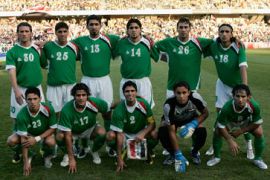Iraqi players seek asylum
Three Iraqi players and an assistant coach stay in Australia.

 |
| Iraq tangled with Australia for a place at the Beijing Olympics [GALLO/GETTY] |
Three members of Iraq’s Olympic football team and an assistant coach are reportedly seeking asylum in Australia.
Iraq’s football federation secretary-general, Tariq Ahmed, said that the four disappeared at dawn Sunday from the home of colleagues in Australia, where they were staying after playing Australia’s Olympic team.
They did not show up at the airport for their scheduled departure with the rest of their team a few hours later, he said.
The assistant coach, Saadi Toma, later phoned team officials and told them he and the three players; identified as Ali Mansour, Ali Khidhayyir and Ali Abbas; were seeking asylum in Australia, Ahmed said.
“It’s because of the deteriorated security situation and violence against athletes in Iraq,” Ahmed said in Baghdad.
“We all face the same danger, but it doesn’t mean one should so easily abandon his team and defame his country’s reputation.”
Visas still valid
However, a spokeswoman from the office of Australian Immigration Minister Kevin Andrews said the group were yet to officially apply for asylum.
“They have still got valid visas, so we are not looking for them,” she said.
“It is up to them to come to the Department [of Immigration] if they want to make any claim for asylum or protection.”
Regular visas are for three months, so the players would have some time before they need to submit asylum applications.
On Saturday, Australia beat the Iraqi team 2-0 in a qualifying round ahead of the Beijing Olympics, which begin next August.
Iraq is scheduled to play Lebanon and Syria this week.
“This will cause poor morale, and have a bad psychological effect on the other players,” Ahmed said of the asylum request.
“They should have waited until finishing the qualifying round, and then they could go wherever they want.
“This only shows disloyalty to the country.”
Dangers on the home front
The national team’s successes in the past three years have provided a joyous distraction from the daily violence in Iraq.
When Iraq won the Asian Cup in July, Baghdad erupted in raucous street parties to celebrate the victory despite the precarious security situation.
Three members of that side, which differs from Iraq’s Olympic team but shares some of the same players, refused to return home to Iraq after the Asia Cup victory.
Team captain and star Younis Mahmoud, as well as Nashat Akram and Hawar Mulla Mohammed, said they feared for their lives if they returned.
Athletes and sports officials have been frequent targets of violence; threats, kidnappings and assassination attempts that are either part of retaliatory violence between Shiites and Sunnis, or for ransom.
In Canberra, Iraqi Ambassador Ghanim al-Shibli said that he was “disappointed” that the men had disappeared.
He said he would discuss the case with Australian officials.